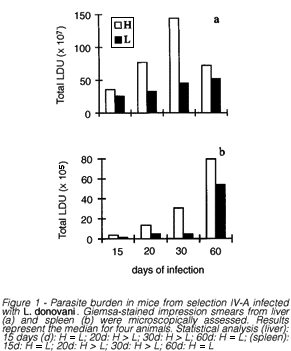Leishmaniasis is a typical parasite infection whose protective immunity depends on macrophage activation. Susceptibility to Leishmania donovani infection was compared in H (high antibody responder) and L (low antibody responder) mice from selection IV-A. H mice infected intravenously with 10(7) amastigotes of L. donovani were more susceptible to infection than their L counterparts. This higher susceptibility was characterized by a higher splenic and hepatic parasite burden. An increased splenic index was observed in both lines after sixty days of infection. This splenomegaly was caused, at least partially, by an increase in the number of splenic cells as determined by direct counts of cells from spleen. The results show that selection IV-A is susceptible to visceral leishmaniasis, with the H line being more susceptible than the L line.
Leishmania donovani; Biozzi mice


